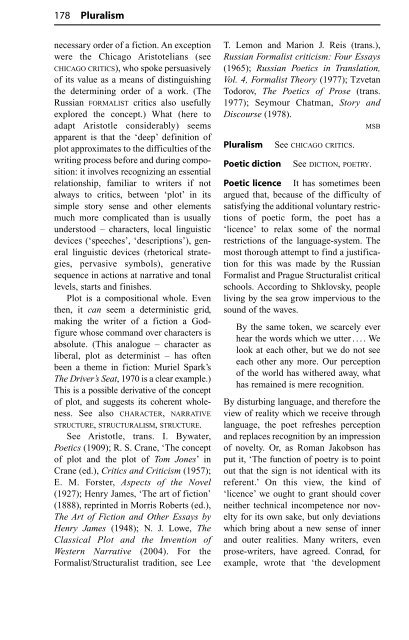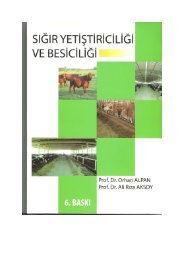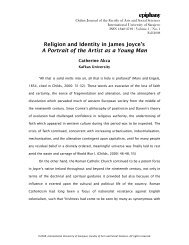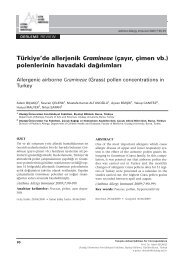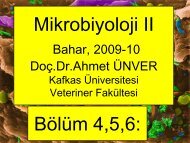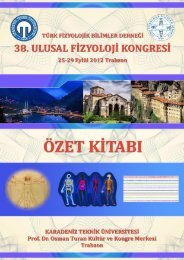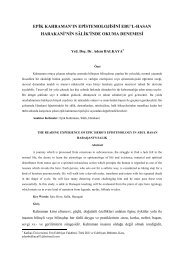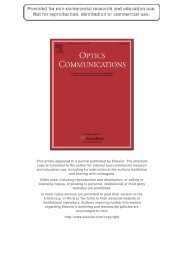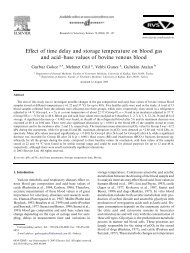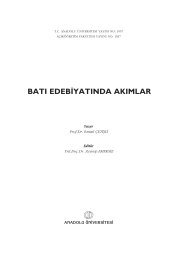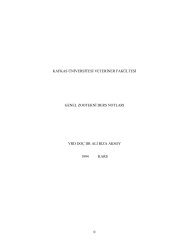The Routledge Dictionary of Literary Terms
The Routledge Dictionary of Literary Terms
The Routledge Dictionary of Literary Terms
Create successful ePaper yourself
Turn your PDF publications into a flip-book with our unique Google optimized e-Paper software.
178 Pluralism<br />
necessary order <strong>of</strong> a fiction. An exception<br />
were the Chicago Aristotelians (see<br />
CHICAGO CRITICS), who spoke persuasively<br />
<strong>of</strong> its value as a means <strong>of</strong> distinguishing<br />
the determining order <strong>of</strong> a work. (<strong>The</strong><br />
Russian FORMALIST critics also usefully<br />
explored the concept.) What (here to<br />
adapt Aristotle considerably) seems<br />
apparent is that the ‘deep’ definition <strong>of</strong><br />
plot approximates to the difficulties <strong>of</strong> the<br />
writing process before and during composition:<br />
it involves recognizing an essential<br />
relationship, familiar to writers if not<br />
always to critics, between ‘plot’ in its<br />
simple story sense and other elements<br />
much more complicated than is usually<br />
understood – characters, local linguistic<br />
devices (‘speeches’, ‘descriptions’), general<br />
linguistic devices (rhetorical strategies,<br />
pervasive symbols), generative<br />
sequence in actions at narrative and tonal<br />
levels, starts and finishes.<br />
Plot is a compositional whole. Even<br />
then, it can seem a deterministic grid,<br />
making the writer <strong>of</strong> a fiction a Godfigure<br />
whose command over characters is<br />
absolute. (This analogue – character as<br />
liberal, plot as determinist – has <strong>of</strong>ten<br />
been a theme in fiction: Muriel Spark’s<br />
<strong>The</strong> Driver’s Seat, 1970 is a clear example.)<br />
This is a possible derivative <strong>of</strong> the concept<br />
<strong>of</strong> plot, and suggests its coherent wholeness.<br />
See also CHARACTER, NARRATIVE<br />
STRUCTURE, STRUCTURALISM, STRUCTURE.<br />
See Aristotle, trans. I. Bywater,<br />
Poetics (1909); R. S. Crane, ‘<strong>The</strong> concept<br />
<strong>of</strong> plot and the plot <strong>of</strong> Tom Jones’ in<br />
Crane (ed.), Critics and Criticism (1957);<br />
E. M. Forster, Aspects <strong>of</strong> the Novel<br />
(1927); Henry James, ‘<strong>The</strong> art <strong>of</strong> fiction’<br />
(1888), reprinted in Morris Roberts (ed.),<br />
<strong>The</strong> Art <strong>of</strong> Fiction and Other Essays by<br />
Henry James (1948); N. J. Lowe, <strong>The</strong><br />
Classical Plot and the Invention <strong>of</strong><br />
Western Narrative (2004). For the<br />
Formalist/Structuralist tradition, see Lee<br />
T. Lemon and Marion J. Reis (trans.),<br />
Russian Formalist criticism: Four Essays<br />
(1965); Russian Poetics in Translation,<br />
Vol. 4, Formalist <strong>The</strong>ory (1977); Tzvetan<br />
Todorov, <strong>The</strong> Poetics <strong>of</strong> Prose (trans.<br />
1977); Seymour Chatman, Story and<br />
Discourse (1978).<br />
Pluralism See CHICAGO CRITICS.<br />
Poetic diction See DICTION, POETRY.<br />
MSB<br />
Poetic licence It has sometimes been<br />
argued that, because <strong>of</strong> the difficulty <strong>of</strong><br />
satisfying the additional voluntary restrictions<br />
<strong>of</strong> poetic form, the poet has a<br />
‘licence’ to relax some <strong>of</strong> the normal<br />
restrictions <strong>of</strong> the language-system. <strong>The</strong><br />
most thorough attempt to find a justification<br />
for this was made by the Russian<br />
Formalist and Prague Structuralist critical<br />
schools. According to Shklovsky, people<br />
living by the sea grow impervious to the<br />
sound <strong>of</strong> the waves.<br />
By the same token, we scarcely ever<br />
hear the words which we utter.... We<br />
look at each other, but we do not see<br />
each other any more. Our perception<br />
<strong>of</strong> the world has withered away, what<br />
has remained is mere recognition.<br />
By disturbing language, and therefore the<br />
view <strong>of</strong> reality which we receive through<br />
language, the poet refreshes perception<br />
and replaces recognition by an impression<br />
<strong>of</strong> novelty. Or, as Roman Jakobson has<br />
put it, ‘<strong>The</strong> function <strong>of</strong> poetry is to point<br />
out that the sign is not identical with its<br />
referent.’ On this view, the kind <strong>of</strong><br />
‘licence’ we ought to grant should cover<br />
neither technical incompetence nor novelty<br />
for its own sake, but only deviations<br />
which bring about a new sense <strong>of</strong> inner<br />
and outer realities. Many writers, even<br />
prose-writers, have agreed. Conrad, for<br />
example, wrote that ‘the development


